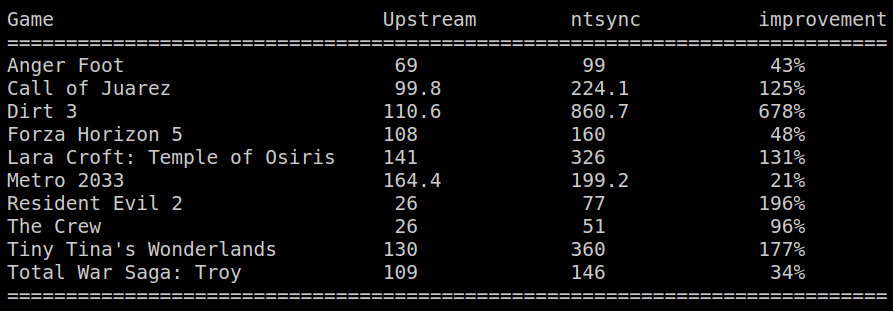- cross-posted to:
- [email protected]
- cross-posted to:
- [email protected]
Is that real 50%? In my experience whenever such numbers are thrown around it actually means that a specific function call might be 50 % faster but overall it just means 50 % of a frame per second more.
Edit:

Hmm… I tried running Metro 2033 a while ago and the performance even in the main menu was absolute trash - like unplayable bad. Granted, I don’t have a high end system (i5-10400F, 6650 XT), but I have no idea what they used to get 164 FPS even without ntsync.
Makes me wonder though, on whether this primarily affects games that have a tendency to run badly under Linux so far. Would of course still be a good improvement but maybe not the be all end all for everything.
I suspect this is comparing against default Wine without fsync or esync (which are included with Proton and some wine builds) but from memory, ntsync has better compatibility and some performance gains over fsync (the next fastest alternative). But don’t expect 50% performance gains compared to fsync in most workloads.
Any bit of improvement is good in my book, though I agree that the title is a bit misleading.
Its indeed on average 50%… in some games… Sometimes only 5% while in other cases even 150%.
Yep, and most people are already using fsync anyways via proton/lutris/etc. so the gain is a bit misleading.
This is from February. Did it make it?
It didn’t make it into kernel 6.10, right? so maybe 6.11
This sounds wonderful. I played Windows games on Linux for a decade, and it was often a painful experience. I’d love to see some real life in-game comparisons to illustrate what this brings to the table!
I wish there were comparison numbers with windows too
Mailing list: https://lore.kernel.org/lkml/[email protected]/
I promise I won’t go more into the tech bits meant for developers 😅
Checks if they’re still on/coming from programming.dev
Oh so it’d be a kernel update?
That could mean quite awhile before the normie distros see it?







